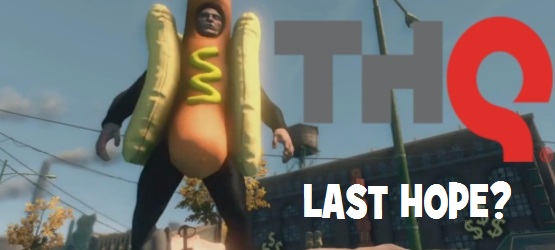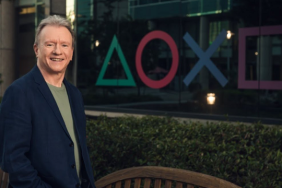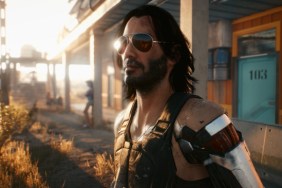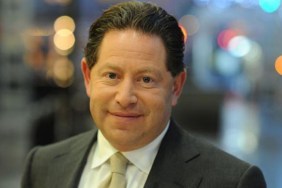With THQ’s share price having collapsed and rumors of bankruptcy, studio closures or a sale swirling, the Daily Reaction crew of Dan and Seb discuss the road THQ has taken to get to this point.
Dan: THQ is a company that has been around for years, and has had a significant presence in the gaming world, as they have produced a number of great titles throughout their history. Sadly even though they have a decent lineage of titles under their belt, they are currently one of the next major publishers to be facing bankruptcy. As at the end of this quarter (Dec 31) they will be projected to be at a loss of $56 million dollars, and might be forced to sell off IPs, studios, and anything that isn’t nailed down, just to pull themselves out of the fire.
One of the biggest hits THQ faced this year was the incredibly bad judgment call on last year’s production of the uDraw game that they projected to be a complete success on HD consoles. Sadly, as THQ were sitting with almost $100 million dollars worth of inventory from that product alone, months after it’s release, they were forced to take a significant loss just to clear out inventory. A loss that had not been notified to shareholders who had the legal right to know the stance of the company, and as the news came out, those who owned stock in THQ filed a lawsuit against the company for not disclosing this vital hit to the company’s worth. This complete fuck-up should have been a wake up call to THQ and their partners, and shown them that as a company they really had lost touch with the market and its audience, but instead they continued business as normal, over relying on sales of specific franchises and completely screwed themselves over.
Seb: The uDraw fiasco was just the tip of the iceberg, sadly. Darksiders 2, for example, didn’t sell very well at all and probably will make them a loss. Their reasoning as to why this happened? “Observing this and other recent industry releases, one is left with a firm understanding that in the current marketplace, only the absolute top tier of releases is making an impact on the game consumer.” Really? It took you till late 2012 to realize that the mid-tier market has bottomed out?
The death of mid-tier happened early this gen and killed THQ’s profits way back then. 2007 was a bumper year for them as they made $1 billion in revenue for the first time. But things began to fall apart, and after hundreds of millions of dollars of losses in 2008 they closed 5 development studios. They reacted slowly, watching their money drain away and investors leave. And when they did finally try to react, they did so with incredibly poor planning. Homefront was their attempt at trying to cash in on the success of Call of Duty – they invested heavily with money they didn’t have, and failed. Polygon have written a fantastically depressing look at how everything was destined to fail from the beginning, and how THQ’s desperation to make it like COD was the game’s very undoing. Now Kaos is gone and THQ had to explain to investors once again why things had gone wrong.
Their history is riddled with a multitude of poor and baffling business moves, like the 2008 purchase of Big Huge Games in 2008, followed by the near closure, and then sale, of Big Huge Games in 2009 – before the studio could release a title, wasting the money invested in the two games in development.
Now, THQ has around $36 million in cash, but some analysts believe they’re spending $15 million a month. They don’t have any more major releases coming out this year. Oh, and they have to pay back $100 million by March 2014.
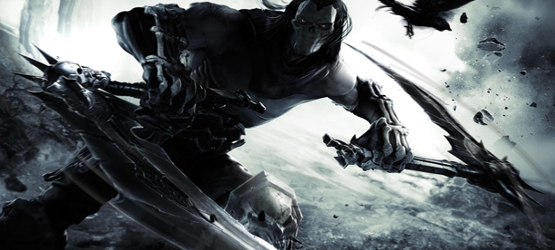
Dan: Simply put, things don’t look good for THQ. As they have developed some quality titles like Darksiders 1 and 2, and are the home of the Saints Row series, they really have never broken past that mid-tier level of development. The reasons why are debatable, but it seems obvious that they haven’t brought much of anything new to the market that has been successful in years. Most of their biggest hitters this generation are only takes on existing titles that are already in the hands of consumers, and can only reach a portion of that already segmented audience, placing THQ further down the drain after their big success in 2007.
On top of all the other issues THQ was having with lawsuits and bad judgment calls on products, 2012 was infested with delays on some of their most prominent titles. Having announced the delay of the South Park game, Company of Heroes 2, and Metro: Last Light, THQ has placed themselves in a very bad spot especially as the financial year comes to a close. Instead of launching around Q4, both Company of Heroes 2 and Metro: Last Light will be taking on major hitters like BioShock Infinite outside of the holiday window. A move that will probably be a death sentence, especially since they also pushed off Saints Row the Third’s DLC into Saints Row 4.
As 2012 really could be the defining year for their future, it’s a wonder why they are pushing everything out as far as possible, instead of getting cash where they can. It is possible that THQ will sell of as much of the company as possible, and try to re-establish themselves using only a small handful of titles. Whether or not this is what they do, or even if it will work is something we can only wait to find out about, I just wish the best for THQ’s employees and their families who are having to weather this storm.
Seb: From a gamer’s perspective, I’m proud of THQ for delaying their games to improve the quality of the titles. It’s the first big move by new president Jason Rubin, of Naughty Dog fame. But I can’t help but think they underestimated how the market would react. Their shares plummeted nearly 50%, and they weren’t very high to start with.
They’ve brought on Centerview Partners to “evaluate strategic alternatives”, which essentially means they’re open to a sale. Really, they need to sell or work out another way to raise capital to hang on until they can right the ship. But to do that they need to get investors upbeat about their future.
Delaying games is a risky strategy, but the quality could pay off long term – if they can make it long term. Rubin states ten titles are in development, including the baffling decision to pay Crytek to bring out another Homefront – something that seems more like an attempt to show investors they have a big plan for the franchise, than to make actual money. They cut inSane, which is a shame for players, but is probably a smart move considering the fact that it seemed like a long shot. They’ve also lost licenses from Adidas, Marvel and DreamWorks, which hurt them over the past few years, but will force them to invest in their own IP – crucial to making a return in today’s industry. However, the loss of UFC was a shame for both gamers and investors as it could have continued to make a decent profit, so you really have to wonder why they sold the license to EA.
THQ will always have a place in my heart, from when I used to eagerly play ‘WWF’ back in the day. But over the last few years they have fallen further and further down a dark hole, hemorrhaging money, investors and studios. The appointment of Jason Rubin was the first sign that they actually want to try to climb out. But it might be too late.
What was the last THQ game you bought? Do you think that THQ can turn things around? Or will they join the long line of companies to go under this generation? Let us know in the comments, or by sending us a pic of yourself in a hotdog costume to Seb and Dan on twitter.
Be sure to email DR ideas, podcast comments and general stupid stuff to DailyReaction@PlayStationLifeStyle.net to enter a competition to win the key to Seb’s heart.
